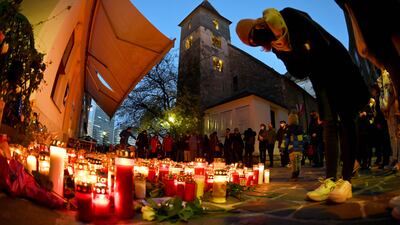An annual European conference to review the work of government policies on Islamist extremism was launched last week in Vienna. The process is a landmark effort to expose and deal with a subterranean force that has steadily risen across the continent. The event, at a palace in Vienna, featured governments from the left, centrist and centre-right from across Europe.
The need to act was laid bare in a 200-page document presented to the meeting. At the heart of the initiative is an examination of the pervasive roots that the Muslim Brotherhood has set down in western societies.
The report contended that organisations controlled by ideologues exist to tap into the European social mainstream. By controlling resources and building up a following in disparate countries they tend to become gatekeepers or power brokers. This happens in ways that conventional western politicians are not well equipped to understand, much less resist.
One aspect that does not sit comfortably for those behind the conference is that there is a substantial stream of funding from outside the bloc to the Muslim Brotherhood groups. This has provided them with means to establish organisational structures that execute their goals without external scrutiny.
Just as concerning is that these groups are increasingly co-opting public funding to enable expansion and provide a seal of approval that is ruthlessly exploited to develop in sophistication.
One of the recommendations of the report to the governments working in this alliance is to diminish the flow of these funds as a matter of state policy. This follows on from advice that while governments need to engage with the organisations, officials must be careful not to empower the front men ultimately loyal to the Muslim Brotherhood's political project.
These two precepts demand that governments must raise their game when it comes to the companies, charities, community organisations, educational trusts and community bodies that are controlled by the Muslim Brotherhood.
This building knowledge operation is particularly challenging when the observed history of the Muslim Brotherhood is that the movement largely operates within the law. Yet for Europe, its views and goals are problematic. Therefore it is essential that officials are well acquainted with its structures, tactics and goals.
A cluster of about 300 Muslim Brotherhood operators are key to understanding how this front works. They perform leadership roles at a raft of front operations.
At an umbrella level, there is the Federation of Islamic Organisations in Europe, which last year changed its name to the Council of European Muslims. The report finds that its 36 members from 26 countries are identifiable as the primary Muslim Brotherhood bodies in each nation.

Where women are in prominent positions they are invariably wives or daughters of high level figures in the movement.
Name changes are very important in the shape shifting Muslim Brotherhood operation around Europe. A good fall-back for figuring out what is going on is to look at the names on the councils or leadership bodies. Follow the money, is another useful tracking tactic – as is tracing the names of people named as principal officers. Often there is a pattern of recycled names and transfers of resources that establish direct links.
Other bodies with notable offshoots include the European Institute for Human Sciences, the most senior French entity in the archipelago.
The Dublin-based European Council for Fatwa and Research is a leading force in bringing the Muslim Brotherhood’s influence to the technological and social media biosphere in Europe. Irish authorities are ill-equipped regulators for the milieu that has established in the country, which has a direct line to Yusuf Al Qaradawi, the effective ideological leader of the Brotherhood.
The report also names Europe Trust as a key node in this network. This UK-based organisation sits at the heart of charitable activity and has massive financial power to deploy in the interests of the movement.
The countries involved in the process, including Austria, Germany, France, Netherlands and the EU, have committed to review how they work together to frame policy responses.
The best practice principles deserve wider exposure. The officials have committed to upgrade research units into the activities of the Muslim Brotherhood.
The information generated can be sifted in a co-ordinated bureaucratic process. The objective for the commissions in each country would be to jointly take action against active leaders, networks and the ideology.
The countries involved also recognised that too many European countries fail to take on board the extent of the challenge of Muslim Brotherhood organisations. Thus there is a need to underpin the process by opening it up to European countries to come onboard. The Vienna conference agreed on a specific agenda of bringing other states into the systemic approach.
Countering extremism is ever more complex. In Europe there is a recalibration of how to tackle extremism. The great danger is that there has been no clear consensus to underpin the process.
People deserve the right to live on equal terms in their own society. Political and policy leaders can take a lead from Vienna to ensure that extremists are not exploiting gatekeeper positions.


